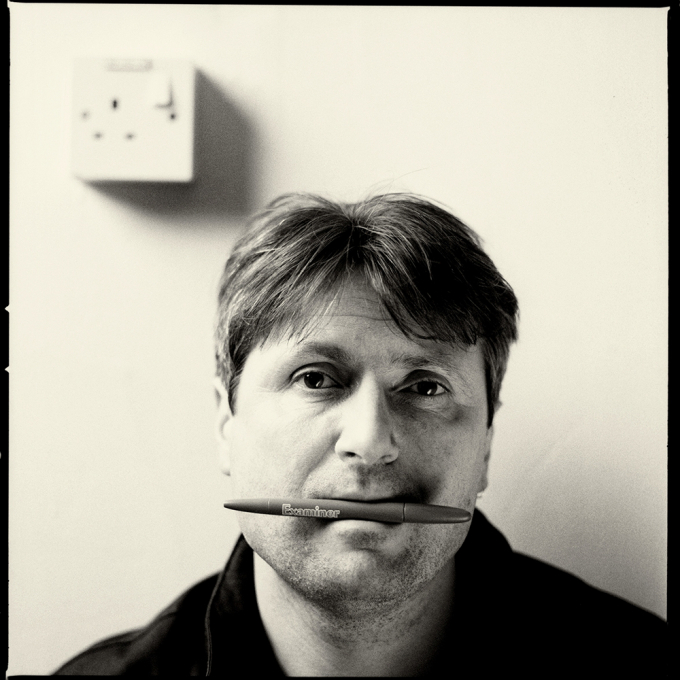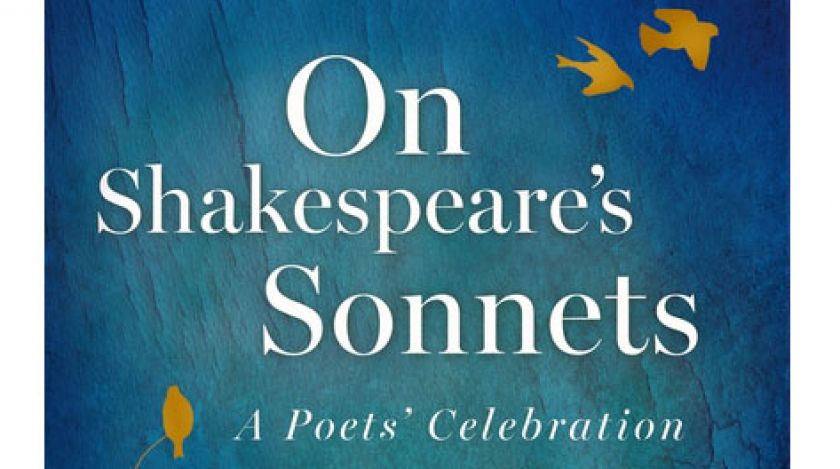
- ©
- Paul Wolfgang
Simon Armitage
- Huddersfield, England
Biography
Poet and novelist Simon Armitage was born in 1963 in Huddersfield, England.
After studying Geography at Portsmouth Polytechnic, he worked with young offenders before gaining a postgraduate qualification in social work at Manchester University. He worked as a probation officer in Oldham until 1994.
His poetry books include Zoom! (1989), Kid (1992), and CloudCuckooLand (1997), which contains the poem 'The Tyre', adapted as a short film in 2000, and 'Eclipse', a short performance piece for young people commissioned by the National Theatre in London. He won an Eric Gregory Award in 1988, was named 'Most Promising Young Poet' at the inaugural Forward Poetry Prize in 1992, won the Sunday Times Young Writer of the Year Award in 1993, and was Poet-in-Residence for the New Millennium Experience Company in 1999. Mister Heracles (2000), an adaptation of Euripides' Heracles, was commissioned by the West Yorkshire Playhouse. His Selected Poems was published in 2001, followed by The Universal Home Doctor (2002) and a new verse adaptation of Homer's epic, Odyssey, in 2006. His stage plays include Mister Heracles and Jerusalem (2005), which was also commissioned by the West Yorkshire Playhouse. Simon Armitage has worked extensively in film, radio and television. He wrote and presented Xanadu (1992), a 'poem film for television', broadcast by BBC television as part of the 'Words on Film' series, and his film about the American poet Weldon Kees was broadcast by the BBC in 1993. He also wrote and narrated Saturday Night, a documentary about Leeds, and Drinking for England, both broadcast by the BBC in 1996 as part of the 'Modern Times' series. Moon Country (1996), written with Glynn Maxwell, retraced a visit to Iceland in 1936 by the poets W. H. Auden and Louis MacNeice, and was adapted as a six-part series, Second Draft from Saga Land, broadcast by BBC Radio 3. He also wrote the song lyrics for the award-winning Channel 4 film, Feltham Sings, and the libretto for the opera The Assassin Tree, premiered at the Edinburgh International Festival in 2006. Out of the Blue (2008) collects three pieces written in response to the anniversaries of three conflicts: a film-poem about 9/11; a piece commissioned by Channel 5 for VE Day; and a radio poem on Cambodia 30 years after the rise of the Khmer Rouge.
He is also the author of All Points North (1998), a collection of essays about the north of England, and Gig (2008), a memoir of a life of music and poetry. His first novel, Little Green Man (2001), the story of 30-something divorcee Barney and his attempt to relive childhood experiences, explores the darker side of male friendship. His second, The White Stuff (2004), by turns comic and moving, examines issues of childlessness and identity.
Simon Armitage has taught at the University of Leeds, the University of Iowa's Writers' Workshop, and as a senior lecturer Manchester Metropolitan University. He has been a Professor of Poetry at Sheffield University since 2011. He became a Fellow of the Royal Society of Literature in 2004. 2007 saw the publication of his translation, Sir Gawain and the Green Knight. The Not Dead (2008) is a collection of poems which tell the stories of veterans of the Gulf, Bosnia and Malayan wars. The Poetry of Birds, a collection of poetry he edited with Tim Dee, was published in late 2009. He was an Artist-in-Residence at London's South Bank from 2009 to 2012, during which time he conceived and curated Poetry Parnassus, a gathering of world poets and poetry from every Olympic nation as part of Britain's Cultural Olympiad, a landmark event generally recognised as the biggest coming together of international poets in history.
In 2010, Seeing Stars was published - described as a "collection of dramatic monologues, allegories, parables and tall tales" - and shortlisted for the 2010 T.S. Eliot Prize. In the same year he was awarded a CBE for services to poetry. He published verse translations of The Death of King Arthur in 2012 and Pearl in 2017, and a new collection of poems, The Unaccompanied, in 2017. Flit (2018) is a collection of poems written in response to Armitage's residency at the Yorkshire Sculpture Park.
In 2015, Armitage was elected Oxford Professor of Poetry. He was awarded the Queen's Gold Medal for Poetry in 2018, and was named Poet Laureate in 2019, succeeding Carol Ann Duffy in the role.
Critical perspective
Simon Armitage is undoubtedly the most popular and widely known poet of his 1960s-born generation, his work having been regularly anthologised and broadcast on radio and television, his readings and festival appearances always well-attended.
His poetry’s combination of streetwise lingo and contemporary subject matters with a resourceful inventiveness and serious artistic ambition has made it a now longstanding feature on the National Curriculum. In fact, Sean O’Brien has rightly compared his popularity and status to that of Philip Larkin, Armitage having learnt much from his predecessor’s down-to-earth, unflinching and often gritty dealings with the everyday and life’s shortcomings. But Armitage’s voice is fundamentally young and energetic: a mixture of slangy, contemporary jargon and his native northern vernacular that owes as much to Larkin, Ted Hughes and Tony Harrison as it does to Carol Ann Duffy, Weldon Kees and Frank O’Hara. His poems possess a vitality all of their own, a heightened chattiness that combines idiomatic cliché with arresting and often unusual observations and descriptions, spanning Armitage’s favoured territory of tall tales, humorous dramatic monologues and often sinister, noirish anecdotes.
Armitage burst onto the poetry scene with his first collection, Zoom! (1989), his voice completely distinctive, his energetic style fully formed. ‘Snow Joke’, the book’s opening poem, signals the poet’s allegiance to the living language and a northern locale: "Heard the one about the guy from Heaton Mersey?" This is the first of a number of poems that draw parallels between poetry and stand-up comedy, demonstrating Armitage’s acute awareness of the form as artifice and inventive performance. As Ian Samson has noted, Zoom! also marks out Armitage as master of the unexpected opening ("Of all the bloody cheek" from ‘Bus Talk’; "Harold Garfinkel can go fuck himself" from ‘Phenomenology’) and the click-shut conclusion: "If you only pay peanuts, you’re working with monkeys" from ‘Eighties, Nineties’; "I could have scored. I could have contended" from ‘Ten Pence Story’. What the collection ultimately demonstrates, however, is a young poet who already appears to be at the peak of his powers, as comfortable and able writing about a male mechanic guiding a woman through car maintenance (‘Very Simply Topping Up the Brake Fluid’) as with figuring language and poetry itself as a supernatural ‘Billiard ball weighing more than Saturn’ (‘Zoom!’).
Armitage’s second collection, Kid (1992), continues to reiterate the winsome effects and qualities of his earlier poetry, but also reveals the beginnings of a decidedly more sober lyric style, something that dominates later work. As a result, poems such as ‘Brassneck’, where a couple of rough-and-ready petty thieves go "down in the crowds at the [football] grounds where the bread is: […] walk[ing] off the terrace / with a grand exactly / in dog-eared tenners", share space with pieces such as the elegant, tender and moving ‘At Sea’: "It is not through weeping, / but all evening the pale blue eye / on your most photogenic side has kept / its own unfathomable tide". Winner of the first Forward Poetry Prize (Most Promising Young Poet), Kid also contains some of Armitage’s most memorable poems to date, not least the sonnet ‘Poem’, an Auden-esque exploration of morality and the contradictions that make up a life: "And every week he tipped up half his wage. / And what he didn’t spend each week he saved. / And praised his wife for every meal she made. / And once, for laughing, punched her in the face."
In his third collection, Book of Matches (1993), an almost Muldoonian playfulness takes hold of Armitage’s most autobiographical poems: a sequence of loose sonnets taking the same time to read as a match does to burn. Heartfelt humour often marks these pieces, as in the following opening lines: "My father thought it bloody queer, / the day I rolled home with a ring of silver in my ear / half hidden by a mop of hair. ‘You’ve lost your head. / If that’s how easily you’re led / you should have had it through your nose instead'." But the collection also contains pithy tales of blunt and coolheaded contemporary violence: "I let him have it / on the top road out of Harrogate – once / with the head, then six times with the krooklok / in the face – and didn’t even swerve" (‘Hitcher’). One of Armitage’s longstanding poetic strengths – a willingness to tackle almost any subject – is also evident in a fourth collection, The Dead Sea Poems (1995), taking in such topics as the poet’s own productivity, homelessness, stand-up comedy, self-harm, a millennial bonfire, and, of course, the famous scrolls of the book’s title. Though weakened by the drawn-out inconsequentiality of ‘The Whole of the Sky’, a long sequence on the constellations, Armitage’s fifth collection, Cloudcuckooland (1997), harbours similar strengths: the ordinary object of a tyre in one poem is brilliantly metamorphosed into a creature "sloughed, unconscious, warm to the touch, / its gashed, rhinoceros, sea-lion skin / nursing a gallon of rain in its gut."
However, as James Lasdun noted in the Times Literary Supplement, Cloudcuckooland felt "like a transitional book; wrestling with old habits, stating new ambitions", and it was to Armitage’s credit and his writing’s benefit that he branched out into novels and prose in general. This started with All Points North (1998), a collection of essays and anecdotes which quickly became a bestseller, not least because Armitage’s jaunty, moving and often humorous prose style was so evocative of his much-lauded Yorkshire compatriot, Alan Bennett. Though predictably laddish in its plot and characters, Armitage’s first novel, Little Green Man (2001), was also a success: a poet’s eye for detail and capacity for highly suggestive description making it a bold and impressive debut, something he – perhaps for the worst – attempted to move away from in his somewhat more suppressed and serious second, The White Stuff (2004).
If such occasional shortcomings were evident in his early prose, however, Armitage’s poetry saw itself finding a deeper, darker, and near-elegiac new direction. In poems such as ‘The Twang’ and ‘The Laughing Stock’ from The Universal Home Doctor (2002), a rebarbative edge appears in Armitage’s voice, his – albeit humorous – dealings with Englishness and national identity often reminiscent of Peter Reading and Sean O’Brien. But Armitage is never content mourning for times past, and his most recent collection, Tyrannosaurus Rex versus the Corduroy Kid (2006) mixes poems of stark political relevance and mythological potency with those of absurdist humour and moving poignancy, including a suitably fantastical and upbeat elegy for the late American poet, Michael Donaghy. Starting with 2006’s The Odyssey, Armitage has also begun working on translation, his latest, Sir Gawain and the Green Knight (2007), having been applauded by Nicholas Lezard in The Guardian as "a translation that not only can you actually read for pleasure, but which takes you back closer to the thrill and wonder the poem would have had in the days when it was composed". In such a hectically productive and successful career, then, it is perhaps hard to see where Armitage will turn next. But as Peter Forbes once noted in Poetry Review, "Armitage’s work is exciting enough to ensure that every appearance is eagerly awaited", and as his writing enters its third decade, it may well be that the best is yet to come.
Ben Wilkinson, 2008


